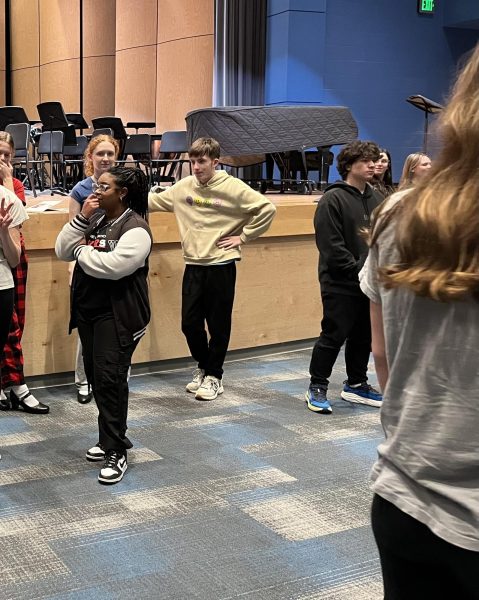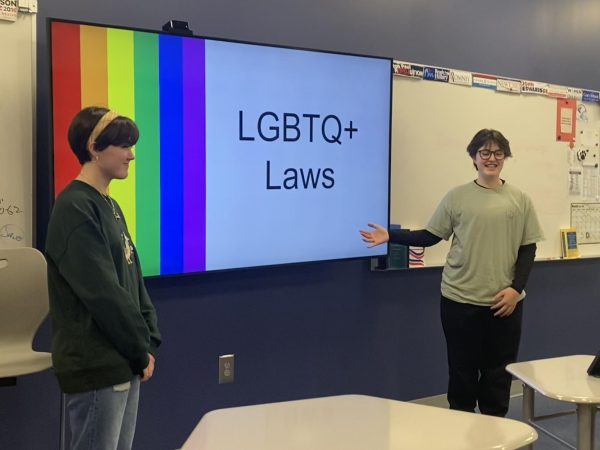College Credit Plus offers opportunities

Dieringer explains the College Credit Plus program to parents of students.
In accordance with state guidelines, Revere High School students have the opportunity to take classes for both high school and college credit simultaneously. The program, known as College Credit Plus replaced the old Post-Secondary program, which started in 1989.
To enroll in the College Credit Plus at the University of Akron, RHS’s partner university, a student must have at least a 3.0 cumulative GPA and a composite ACT score of 21, or a 990 combined math and critical science score on the SAT. Interested students should approach their guidance counselors about the program. If the student wants to take College Credit Plus classes during the fall semester, they must meet several deadlines. They need to sign a “Letter of Intent to Participate” by April 1st and complete an online application by April 15th. The student must ask their guidance counselor to send a transcript to the University of Akron.
Revere guidance counselor Michael Murphey described the main differences between the old Post-Secondary program, and the new College Credit Plus program.
“The biggest [difference is] it allowed for schools to purchase the textbooks instead of kids, so that was a big plus for a lot of kids. It also simplified the credit conversion. It is a lot simpler now in the College Credit Plus program. Now a full semester of a college class counts for 1 credit of a high school class” Murphey said.
Gregory Dieringer, the director of College Credit Plus at the University of Akron, explained the program. He said that the program allows students, starting in 7th grade, to start taking college classes for free.
“The purpose of this program is to promote rigorous academic pursuits and to provide a wide variety of options to college-ready students. Taking a College Credit Plus course from a public college or university is free, which means no cost for tuition, books, or fees. If students choose to attend a private college or university, they may have [some] costs. High schools may have an agreement with a local college for specific courses; however, students can choose to take College Credit Plus courses that would benefit your future from any college. This includes online courses,” Dieringer said.
Dieringer explained the advantages and disadvantages of taking part in College Credit Plus. He said that the program should strengthen high school curriculums, and also raise expectations that students have. Some of the advantages include the reduced cost for college and the chance to graduate earlier. The program also allows for increased opportunities for double majors.
“[It can enrich] the undergraduate college curriculum by lessening the need to retake some introductory courses, consequently allowing earlier entry into more advanced courses, facilitating double majors, or permitting additional electives. One disadvantage is that if a student earns poor grades, those grades are on both the college and high school transcript. If students fail or withdraw from courses they may also be responsible for paying the school district for those courses,” Dieringer said.
English teacher Elizabeth Long described some problems that may occur due to participating in the program.
“Students who plan to attend a private or out-of-state college or university may not receive college credit for these courses.
Additionally, students who plan to take highly rigorous AP classes may feel that these college credit plus courses may not adequately prepare them for their AP coursework. [Also,] while some students may be able to take some online courses, other students will have to provide their own transportation to travel to a university during the school day. The students who are not in the building for a portion of the school day sometimes report a feeling of missing out on their overall high school experience. For some students this is not an issue, but it is an aspect of the program that students may wish to consider,” Long said.
Dieringer said that students who enter the program will be treated like college students and will be expected to follow the college curriculum, attendance rules, and other duties of college students.
“All classes are at the college level and follow the college syllabus and expectations. CCP students are [treated] no differently than any other college student. Depending on the student’s academic background and academic interests, some classes may be require more time and effort in order to be successful,” Dieringer said.
Revere alumnus Zack Swift participated in Post-Secondary, the program the College Credit Plus updated, throughout his senior year at the high school. He decided to enroll into the program full time, so he did not go to Revere High School at all during his senior year. He said that he chose to do it for the increased opportunities that is afforded him, and the financial benefits for him.
“Freedom [was the best part of the program], everything is not mandatory necessarily. You get to decide what you need to do for the betterment of yourself versus just going to school. I also saved a lot of money because I basically took off a semester and a half of school,” Swift said.
As a high school senior, he took 32 credit hours of classes at the University of Akron, which gave him a full year of college credit, and those classes also gave him credits to be able to graduate from Revere. As an engineering student, he took many math classes on top of the classes that he needed for credit at Revere.
“Post-Secondary is basically doing your freshman year. I did 16 credits both semesters, so technically [I was] a full time student,” Swift said.
Even though Swift was still enrolled at the high school, his classes at Akron University were not different from what he would take as a college student.
“[Rigor depends] on the class; math class classes are a lot harder, [they’re] not going to . . . carry you along. In [some cases] they [do not] care at all if you pass [the class],” Swift said.
Swift believes that the program forced him to become motivated about his education. He also said that it allowed him to have more time to work.
“[It] gave me a drive at a younger age. I [did not] feel like I was stuck back at high school. It also gave me more time to work, so I was in Post-Secondary and working 30 hours a week. In my mind it gave me the freedom to make my own decisions,” Swift said.
By taking a year of college early, Swift was able to save a substantial amount of money, and he now has time to do a co-op at Goodyear.
“What happened is… I pushed [my classes] forward about a year. Right now I have to take two semesters off [in order to be on the same track for engineering students]. What [I am] doing is, [I have] a co-op with Goodyear, and if they like me enough, [they will] keep me for the summer. I totalled it up, and [I am] saving $17,000 for taking one year of Post-Secondary,” Swift said.
College Credit Plus gives students another option in their high school career. It comes with benefits such as free college classes and a head start on degrees; however, this program may not be for everyone. Students who want a traditional high school experience may wish to stay with the high school and take Advanced Placement classes for college credit instead.





